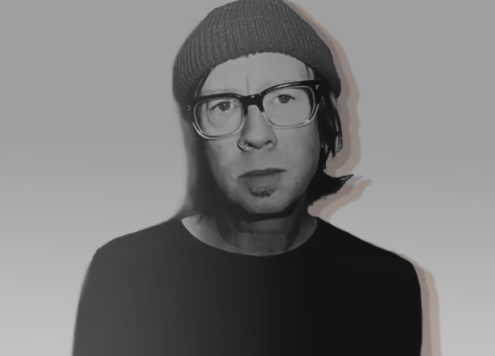Planet B is the newest project from punk rock icon and entrepreneur Justin Pearson, cofounded by underground hip-hop producer Luke Henshaw (Pictured with Martin Atkins). The duo recently released their first full-length album, a self-titled release via Three One G and Ipecac Recordings. Simply put, it’s a perfectly weird and thoroughly enjoyable listening experience.
Planet B combines elements of hip-hop, experimental noise, cinematics, and good old-fashioned punk rock. It’s far from a genre-hopping project, however. The duo mixes these diverse musical aesthetics subtly and organically. Nuances aside, the abrasive and boisterous attitude fans love about other Justin Pearson works is fully celebrated here. But as you blast these tracks (and blast you should), take the occasional step back to fully appreciate the rich production layers, the unusual sampling choices, the interesting beats, cadences, and counter-rhythms, and of course, the ever-bizarre lyricism and vocal work.
The two didn’t form this covalent musical bond overnight. After a few attempts at collaboration, it wasn’t until the scoring of the film Incompresa that a band really started to take shape. The duo released a few 7 inches to get things started and to strengthen their collaborative muscles. The hard work quickly paid off. The accentuation of guest musicians, including Kool Keith and Martin Atkins just to name a few, helped transform Planet B into a complete world unto itself.
Ghettoblaster’s Andrew Humphrey caught up with the Planet B cofounders to chat about their creative methods and the new album.
What are some primary lyrical inspirations for the record?
Justin Pearson: There is an abundance of stuff to write about currently. However, I do think there was an underlying theme of the album as a whole. It sort of has a wake up call in light of the idea of the end of humanity. This may or may not be a good thing, depending on who you ask. We are pretty arrogant creatures. Of course not all of us are, but there is that idea, if you are not part of the solution, you are part of the problem. I also tend to revisit certain terms, phrases, and ideas in the lyrics I write. Part has to be serious, but part has to have some level of humor. You can’t take yourself too serious. I mean, we are only writing songs, not writing policies for a government to run on.
What’s the craziest “sample find”
you’ve ever had when hunting for new sounds to play around with?
Luke Henshaw: Some of the craziest
samples have come from records I didn’t know existed. Taking chances on records
you know nothing about (not the band name, musicians, producers, etc etc.) will
surprise you. However, if I had to pick one, the craziest sample I’ve come
across didn’t come from a record, it came from an old clothesline. I used to
carry a portable DAT around with a mic. I was in my friend’s backyard one day and
was playing with his clothesline like bass. I had him hold the mic in various
positions and managed to get some of the illest sounds that I still manage to
manipulate today.
There are a number of guest performances throughout the record. How did you go about choosing whom you wanted to work with?
JP: I think for the most part we did what was possible and what was presented to us along the way when writing. Some of the collaborators are obvious, such as Joseph Karam, who is in The Locust with me. But we worked on each track, one at a time and all of the elements fell into place as things progressed with the album and the tracks that are on it. Of course we have a long list of people we would love to have on future songs, so we shall see what pans out in due time.
The video for “Disease Control” is pretty gnarly. Trump is obviously a big part of it. If you could talk to him person to person, what would you say to him?
JP: [Video artist] Eric Livingston nailed it. In this day and age, it’s hard to offend or even just make one feel uncomfortable. So perhaps this video reached the outskirts of those feelings. But the question about what I would say to Trump in person is interesting to think about. I was actually just asked this by a friend of mine. You know, my knee jerk reaction would be to smash his skull in. But I think saying nothing would be more effective. I mean, let’s face it, the opportunity to even near his personal space is unlikely. But with a narcissist, the easiest way to crush them would be to ignore them. My in-person reaction to the guy would not really change anything. Maybe get me some Instagram fame depending on how fucked I could get in the matter of seconds and if I have a by-stander filming. But I’d rather get into the facts that he isn’t a regular human. I couldn’t imagine how it must be to live without empathy, and to have fear on the forefront of every thought. And on top of all that, to have never really worked for anything good or decent in life. Yeah, I’d say nothing.
What advice could you offer young hip hop producers out there that might be hunting for some interesting samples or sounds to experiment with?
LH: Damn, I’m not sure I’m qualified to be giving advice, but… Learn how to flip shit. Make it your own. You can sample a familiar sound, add some drums, a bassline and what not and it could come out so “dope” and so “hard.” But that’s referred to as “freaking.” You freaked the sample, which is very important as well and I am very fond of, but that’s not flipping. Flipping is taking that sample, twisting and turning it until it’s unrecognizable to the common ear. I once made an album with D-Styles (Invisibl Skratch Piklz & Beat Junkies) and 95% of the samples I used for my parts were from his album prior to ours. He had no clue.
Any advice for hip hop producers in general?
LH: Again, my advice is probably not the best, but… Stop being lazy. Get off your ass and go dig for new sounds. And stay away from those awful online “Sample Packs.” And most important: Don’t use Hip Hop to make Hip Hop.
Was it a challenge adapting to something with more of a hip hop flavor than past works? Or, did it come more naturally?
JP: Yes, it was a complete challenge. Mainly addressing the placement of the kick on a lot of the material. Also, the phrasing was odd at times, but I had to step back, out of my comfort zone(s) and reference other elements. I also found myself trying to one-up myself and my own delivery. I could see that I did it wrong at times, and try a different approach.
I hear a lot of classic horror or sci-fi movie soundtrack vibes in the music. “Come Bogeyman” obviously comes to mind. Are there any specific films that inspire you when constructing a Planet B track?
LH: It used to bug me when people would say I sound like this and I sound like that, but I’m totally OK with people saying Planet B has a horror/sci fi sound, especially since I used hardly any horror or sci-fi sounds, with the exception of using bits of early electronic pieces which was in turn used to make that stuff. A lot of the sci-fi sounds you hear are pin drop samples and me altering the pitches and tweaking a sort of melody on the MPC. In the case of Come Bogeyman, the whole track was built around Martin Atkins’ drums. It was chance that brought those sounds together. The violin, the Theremin, the organ all came from different records I found at the swap meet a few days before. I got about 15 records that day, and those just happened to be placed in order, 1, 2, 3, and I rolled with it. If those records were placed, 12, 13, 14, then those sounds probably wouldn’t have been on the song. Maybe those sounds would have been on Manure Rally or Brutal Evolution. Hope that makes sense. As for certain films that inspire me? Maybe subconsciously, but I feel the songs just come out that way. I do enjoy both film genres though.
Any live performances or tours in the future?
JP: We just played last weekend for a record release party, and we have plans on hitting the road soon.
Planet B, the self-titled album is out now via Ipecac Recordings and Three One G Records.











Social Media